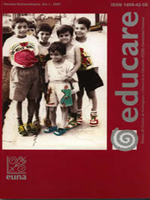Una propuesta educativa para atender la diversidad en el contexto de aula
DOI:
https://doi.org/10.15359/ree.1-Ext.7Keywords:
diversity, individual differences, school context, proposal, workshops, socio-constructivist, educationAbstract
At the present time, schools face a big challenge: providing their students an education of quality and an education for everyone, in other words, an education thought for diversity within the classroom. The goal of this project is to improve the respect for the students` individual differences and make sure that diversity could be applied in to the school context. Based in a diagnostic process developed at the “Escuela Mixta San Juan”, it was found that most students show rejection and disrespect at the individual differences from many point of view.
Authors such as Meléndez (2002), Parcerisa (2000), Olivé (1999) and Aguilar (2000) were revised and they provided some guides to be use at schools in order to deal with the students` diversity. These authors propose that a change of attitude and several different social transformations are required in order to warrant that diversity is appropriately taken care of. As an answer to this situation, a series of workshops and didactic activities designed to improve the cooperative knowledge production and mutual work are proposed.
The proposal is based on a socio-constructivist and inclusive approach, since it attempts to respond to the students` needs within their own context. The most important aspects of diversity were taken into account, such as internal and external aspects related to the individuals. As a final goal, students are expected to express attitudes of respect toward diversity, respond to their classmates and their own educational needs, as well as show and open, critical and flexible attitude to themselves and their environment.
Therefore, future generation’s education must include these skills and abilities, in order to allow them to comprehend this world as an open window to individual and collective improvement.
References
Aguilar, L. (2000). De la integración a la inclusividad. Buenos Aires, Argentina:
Editorial Espacio.
Asamblea Legislativa. (1996). Ley 7600. Igualdad de oportunidades para las personas
con discapacidad en Costa Rica. San José, Costa Rica: Consejo Nacional
de Rehabilitación y Educación Especial.
Cerdas, A. y Rodríguez, A. (2003). Propuesta de actividades para el desarrollo de
las funciones de los docentes de apoyo en retraso mental. Manuscrito no publicado:
San José, Costa Rica.
Devalle, A. y Vega, V (1999). Una escuela en y para la diversidad. El entramado
de la diversidad. Argentina: Aique.
Gutiérrez, E. (2004). Aplicación de la terminología propuesta por la Clasificación
Internacional del Funcionamiento, de la Discapacidad y de la Salud (CIF).
Fundación SIDAR. Retrieved November 14, 2004. From: http:/wwwsidar.
org/recur/desdi/pau/cif.php#def
Instituto de Investigaciones Psicológicas. (2003). Actitudes y creencias de maestros
y administradores de preescolar, primaria y secundaria en relación con la atención de las necesidades educativas especiales. UCR. San José, Costa
Rica.
Instituto Costarricense de Enseñanza Radiofónica. (1994). Algunas sugerencias
para el trabajo en grupos. San José, Costa Rica: Editorial ICER.
Maya, A. (1996). El Taller Educativo. ¿Qué es?, Fundamentos, cómo organizarlo
y dirigirlo, cómo evaluarlo. Bogotá, Colombia.
Meléndez, L. (2002). La inclusión escolar del alumno con discapacidad intelectual.
Bogotá, Colombia: GLARP-IIPD.
Monereo, C. (2000). Instantáneas. Proyectos para atender la diversidad educativa.
Madrid, España: Editorial CELESTE EDICIONES.
Naciones Unidas. (1948). Declaración Universal de Derechos Humanos. Naciones
Unidas.
Parcerisa, A. (2000). Atención a la diversidad: claves para la innovación educativa.
Barcelona, España: Editorial Graó.
UNESCO. (1990). Conferencia Mundial de Educación para Todos. Tailandia.
UNESCO.
UNESCO. (1994). Conferencia Mundial Sobre Necesidades Educativas Especiales:
Acceso y Calidad. Salamanca, España.
Vega, A. (2001). La educación de los niños con síndrome de Down. Principios y
prácticas. Salamanca, España: Editorial Amarú.
Published
How to Cite
Issue
Section
License
1. In case the submitted paper is accepted for publication, the author(s) FREELY, COSTLESS, EXCLUSIVELY AND FOR AN INDEFINITE TERM transfer copyrights and patrimonial rights to Universidad Nacional (UNA, Costa Rica). For more details check the Originality Statement and Copyright Transfer Agreement
2. REUTILIZATION RIGHTS: UNA authorizes authors to use, for any purpose (among them selfarchiving or autoarchiving) and to publish in the Internet in any electronic site, the paper´'s final version, both approved and published (post print), as long as it is done with a non commercial purpose, does not generate derivates without previous consentment and recognizes both publisher's name and authorship.
3. The submission and possible publication of the paper in the Educare Electronic Journal is ruled by the Journal’s editorial policies, the institutional rules of Universidad Nacional and the laws of the Republic of Costa Rica. Additionally, any possible difference of opinion or future dispute shall be settled in accordance with the mechanisms of Alternative Dispute Resolution and the Costa Rican Jurisdiction.
4. In all cases, it is understood that the opinions issued are those of the authors and do not necessarily reflect the position and opinion of Educare, CIDE or Universidad Nacional, Costa Rica. It is also understood that, in the exercise of academic freedom, the authors have carried out a rogorous scientific-academic process of research, reflection and argumentation thar lays within the thematic scope of interest of the Journal.
5. The papers published by Educare Electronic Journal use a Creative Commons License:














 The articles published by Educare Electronic Journal can be shared with a Creative Commons License:
The articles published by Educare Electronic Journal can be shared with a Creative Commons License: 



